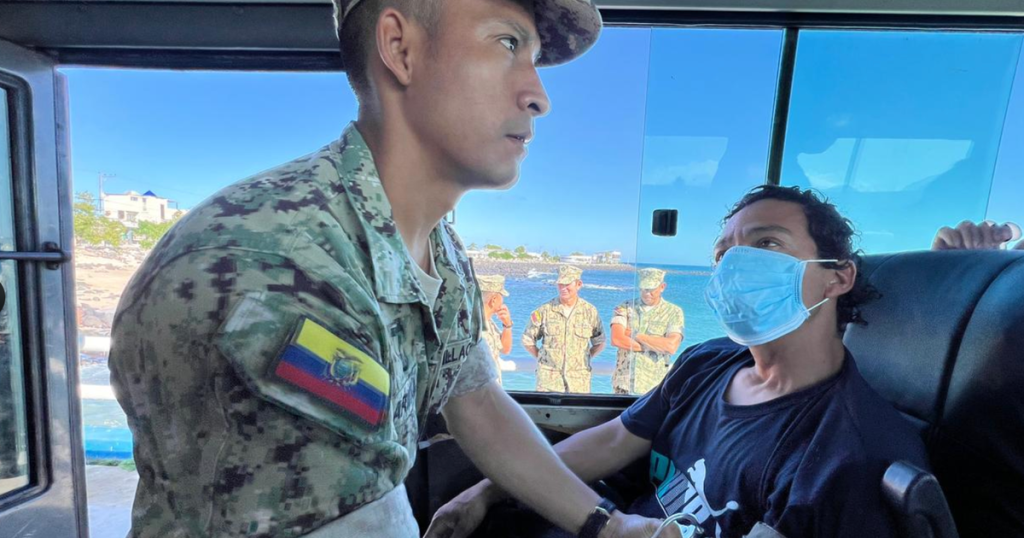In a remarkable tale of survival, five fishermen who were lost at sea for an astonishing 55 days have been rescued and transported to safety in the Galapagos Islands. The group, consisting of three Peruvians and two Colombians, had been missing since mid-March until they were spotted by an Ecuadorian tuna boat on May 7. The Ecuadorian Navy confirmed their safe return, highlighting both the challenges faced during their ordeal and the ongoing coordination efforts with authorities to ensure their well-being.
| Article Subheadings |
|---|
| 1) The Rescue Operation |
| 2) Background of the Fishermen |
| 3) Conditions at Sea |
| 4) Previous Survival Stories |
| 5) Implications and Future Coordination |
The Rescue Operation
On May 7, the Ecuadorian Navy announced the successful rescue of five fishermen who had been adrift for 55 days. The group was located by a tuna fishing vessel named Aldo, which played a crucial role in the operation. Following their recovery, the fishermen were transported to the San Cristobal Navy Base, where officials assessed their physical condition. According to reports, the group appeared stable despite their prolonged exposure to the elements and the hardships they had faced at sea.
The Ecuadorian Navy has since reported that they are collaborating with both domestic and international authorities to facilitate the return of these fishermen to their home countries. This involves ensuring that medical services and psychological support are provided, as the psychological toll of such an ordeal can be significant.
Background of the Fishermen
The five fishermen are comprised of three Peruvian nationals: Vladimir González (32), José Albines (52), José Gabriel Albines (31), and two Colombians: Jhonny García (inferred age of 40) and Jorge Ugarte. Their journey began in mid-March from Pucusana Bay, located south of Lima, Peru, and tragedy struck just two days into their expedition when damage to the boat’s alternator left them stranded.
Being fishermen, the group was likely familiar with the dangers of the sea. However, they found themselves in an unimaginable situation that tested their survival instincts and resourcefulness over an extended period. As they set sail with the hopes of capturing a sizable catch, the misfortune of mechanical failure soon turned their journey into a fight for survival.
Conditions at Sea
The conditions the fishermen faced while adrift are typically harsh, with exposure to extreme weather, hunger, and the psychological impact of isolation. A prolonged period at sea without proper shelter can lead to dehydration, nutritional deficiencies, and much more. Although the navy did not elaborate on the specifics of their survival techniques, one can imagine that they relied on available maritime resources to sustain themselves.
Food scarcity is a concerning aspect of survival at sea. In many similar stories, survivors have resorted to eating whatever they could catch, including fish, seaweeds, or even birds that venture close to the water. Psychological factors also play a significant role; maintaining hope and determination is crucial when facing the direst situations.
Previous Survival Stories
This incident is far from unique, as several remarkable survival stories at sea have come to light in recent years. Earlier this year, another Peruvian fisherman, Máximo Napa, captured significant attention after spending an astounding 95 days adrift before being rescued. His survival tactics included consuming cockroaches, birds, and turtles. Napa’s tale offers insights into the extreme lengths individuals may go to in order to survive, and the emotional aftermath of such experiences.
In another instance, Mikhail Pichugin from Russia survived over two months adrift in a small inflatable boat while drinking rainwater and battling severe isolation. This case illustrates the psychological and physical resilience that some individuals display when navigating similarly perilous circumstances. Such stories indicate a pattern of endurance and resourcefulness that extends beyond geographic boundaries.
Implications and Future Coordination
The rescue of these fishermen highlights the crucial role of international cooperation in maritime safety and rescue operations. The Ecuadorian Navy’s proactive coordination with local and foreign authorities demonstrates a commitment to ensuring safe maritime practices and offers a framework for addressing similar situations in the future.
As fishing accidents continue to pose threats to seafarers, it’s imperative that stronger safety measures be implemented. These strategies may include mandatory equipment checks, safety protocols for vessels, and improved communication systems that can help in tracking vessels at sea more effectively.
| No. | Key Points |
|---|---|
| 1 | Five fishermen rescued after 55 days adrift at sea. |
| 2 | Rescue operation was conducted by an Ecuadorian tuna boat called Aldo. |
| 3 | The fishermen experienced significant challenges, including hunger and exposure. |
| 4 | Previous cases of survival at sea highlight the psychological and physical resilience of individuals. |
| 5 | Calls for enhanced safety regulations and cooperation among maritime authorities. |
Summary
The successful rescue of the five fishermen adrift in the Pacific Ocean underscores the harsh realities faced by those who venture into the sea. Their ordeal reflects both the vulnerability of individuals at sea and the vital role of coordinated rescue efforts. As these fishermen prepare to return home, their story serves as a reminder of the need for enhanced safety protocols and the ongoing responsibility of authorities to protect those who brave the waters.
Frequently Asked Questions
Question: How were the fishermen found?
The fishermen were discovered by an Ecuadorian tuna fishing vessel called Aldo during a routine fishing expedition.
Question: What caused the fishermen to be adrift for so long?
Their boat experienced damage to the alternator just two days after setting sail, leaving them unable to navigate or communicate for the remainder of their journey.
Question: What measures are being taken to ensure the safety of fishermen at sea?
Authorities are discussing enhanced safety protocols, including mandatory equipment checks and improved tracking systems to ensure that vessels can be located promptly in emergencies.
